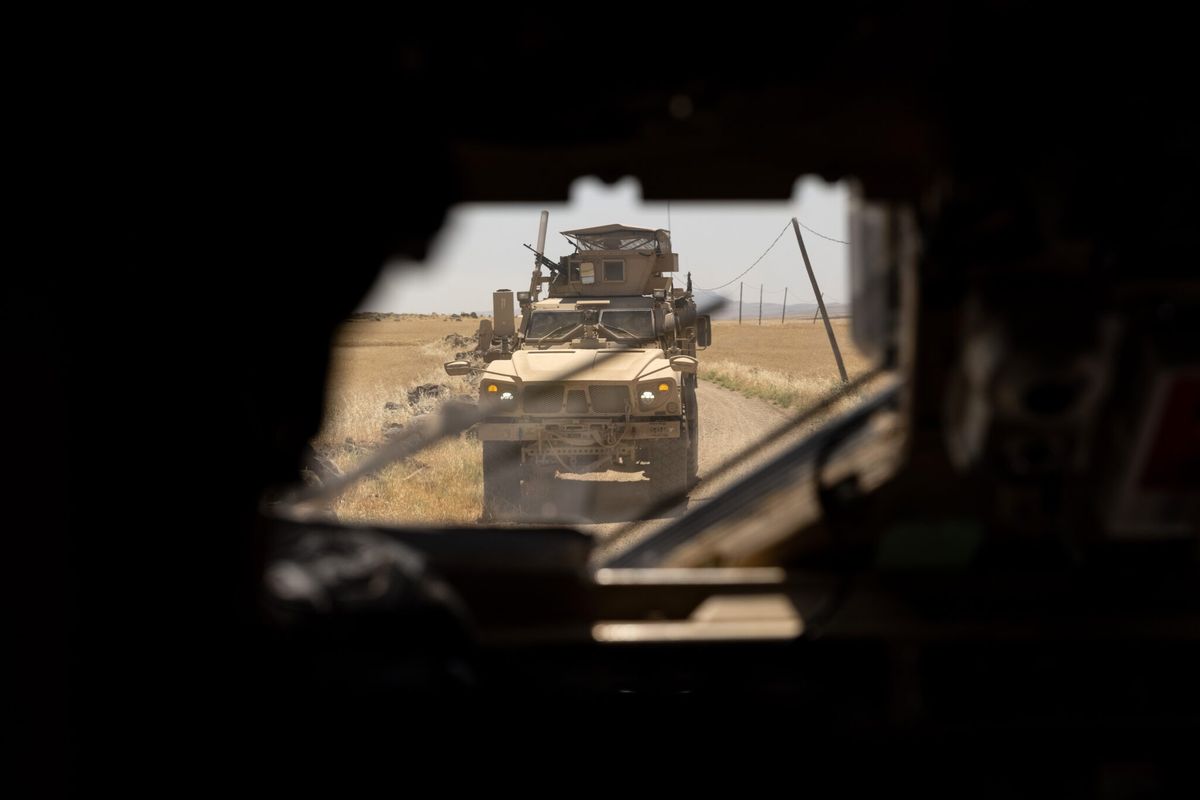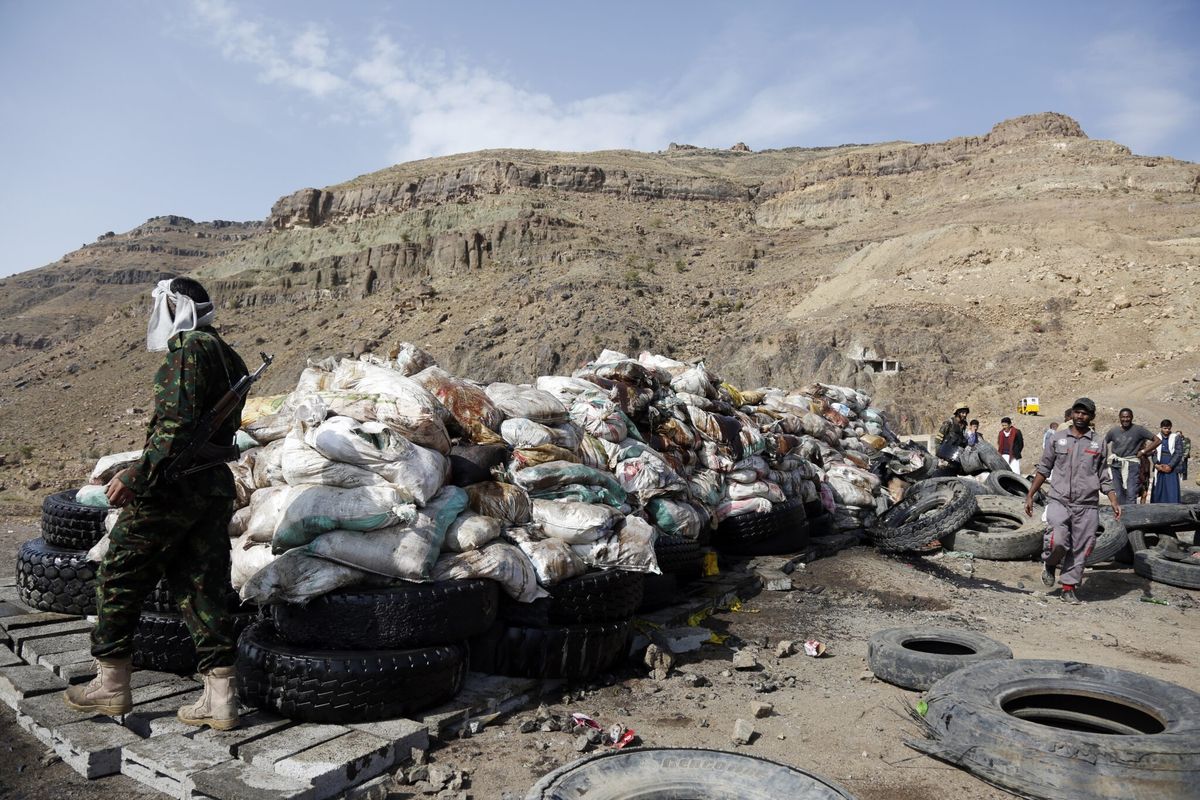The White House late Monday night released a statement warning Syrian President Bashar al-Assad’s regime against launching another chemical weapons attack. The Trump administration said the United States has identified “potential preparations” for an attack that “would likely result in the mass murder of civilians, including innocent children.”
“The activities are similar to preparations the regime made before its April 4, 2017 chemical weapons attack,” the White House said. “As we have previously stated, the United States is in Syria to eliminate the Islamic State of Iraq and Syria. If, however, Mr. Assad conducts another mass murder attack using chemical weapons, he and his military will pay a heavy price.”
In April, the U.S. launched a missile strike on the Syrian Shayrat air base in response to a deadly chemical weapons attack in Idlib province. That marked U.S. forces’ first direct assault on Assad’s regime since the country’s devastating civil war began six years ago. Pentagon spokespeople indicated on Tuesday suspicious activity was seen at that same Air Base.
U.S. Ambassador to the United Nations Nikki Haley wrote in a statement on Twitter that “any further attacks done to the people of Syria will be blamed on Assad, but also on Russia & Iran who support him killing his own people.” She told a House committee on Tuesday that the goal is “not just to send Assad a message, but to send Russia and Iran a message — that if this happens again, we are putting you on notice.”
The Cipher Brief’s Mackenzie Weinger spoke with Robert Ford, former U.S. Ambassador to Syria from 2011 to 2014 and a senior fellow at the Middle East Institute, for his insight on the White House’s statement and its key purpose.
The Cipher Brief: What is your read on the White House statement released late yesterday?
Ambassador Robert Ford: Well, I don’t have access to the intelligence, but two comments come immediately to mind. Number one, the U.S. government’s policy clearly, since April, has been to deter the Syrian government from using chemical weapons in Syria. So this statement fits in that broader policy. It doesn’t seem illogical to me. It’s a little unusual that it comes out in the middle of the night, but it fits with the policy and the objective.
Second, coming from the White House instead of the Defense Department or the State Department, some people might wonder about that. To me, having it come from the White House just gives it a little more weight.
It seems like a reasonable statement if they believe genuinely there’s a risk of new chemical weapons deployment by the Syrian government. Of course, I should mention a third thing — coming publicly as it does, and coming from the White House as it does—if the Syrian government does actually use chemical weapons in the days ahead, they will have left themselves very little margin of maneuver except to deploy military force against Assad. Whereas if they had spoken in private first, maybe they did, but if they had kept their channels private, they would have had a little more wiggle room. This way, they haven’t left themselves much wiggle room.
TCB: You mentioned it’s a policy. Is this also a coherent strategy, or at least an indication of how the Trump administration will act given the previous chemical weapons attack in April —although they did indicate it was a one-off situation at the time?
Amb. Ford: I’m separating the policy objective of deterring further chemical weapons use, which is a distinct, limited policy objective, from what to do about the future of Syria, which is a big, complicated, amorphous issue. I don’t think the White House at all has figured that out yet, or the State Department, or the Defense Department. So I distinguish between the two.
Scaring Assad enough so that he doesn’t use chemical weapons is a short, clearly identifiable thing. You can say it in a sentence. What to do about Syria — and what the American objective is, supporting Syrian Kurds over here and Syrian Arabs over there, and bombing Iranian-backed militias over there, and where this is all going with peace talks or no peace talks — I don’t think we can put that in a sentence. I don’t think the White House has figured that out yet. And until they can put it in a sentence, I don’t think they’ve really dug down deep enough to figure it out. So, to me, they’re too different things.
TCB: I wanted to take a look at what U.S. Ambassador to the United Nations Nikki Haley has said about this. She’s often taken an initial different tack than the White House, such as saying in March that the U.S.’s priority was no longer to “sit there and focus on getting Assad out,” that the White House then follows on to. Today, Haley said the White House’s statement was about sending Assad a message and also putting Russia and Iran “on notice.” What do you think Haley means with this latest statement?
Amb. Ford: I must admit, it was not entirely clear to me. I guess I’d break that down into pieces. I didn’t interpret her remarks to mean they were threatening to bomb Russian or Iranian forces if Assad uses chemical weapons. That’s the first. I didn’t hear anything from the White House statement and I’ve seen no evidence that the Syrian chemical weapons program is physically under the control of the Russians or the Iranians, which is to say if it is used, it will be primarily a Syrian government decision and not a Russian or Iranian decision.
So I’m assuming what Haley meant was putting them “on notice” as in, you don’t want us to hit Assad again? Then stop him from using chemical weapons. Otherwise, shut up. My interpretation of her remarks, then, was she was warning them to deploy their influence with Assad or to remain silent if Assad uses chemical weapons and the Americans do another round of strikes. Russia and Iran will not be in a position to complain because they were publicly warned to act to stop it.
TCB: Going back to the White House statement, they did not present any kind of evidence about the potential preparations with it. Do you have any sense of what that might entail or why they aren’t laying it out for the international community?
Amb. Ford: Number one, getting the Intelligence Community to declassify material such that it can be put out in the public domain usually takes a while. It’s not something that can be done in an hour or two, because usually analysts have to look at it and approve it, go word by word and sentence by sentence. So if they thought there was an urgent need to issue a warning, I can understand they just didn’t have time to declassify for public consumption.
Second, I don’t think the Russians and the Iranians would base whatever they’re going to do — and I think the Americans are trying to prod them to do something — nor would Assad base what he’s trying to do or not do based on satellite images or signals intercepts or whatever it is. I think for the purposes of the deterrence itself, as opposed to convincing the Congress or the American public, for the purposes of deterring the act in Syria, putting out proof publicly is less important.
I’m old enough to remember when [Secretary of State] Colin Powell in 2003 went before the United Nations Security Council with a folder of alleged evidence about Saddam Hussein’s weapons of mass destruction. It was all bogus. So I wouldn’t put too much truck in hastily assembled intelligence presentations. I think it’s reasonable for the House and Senate Intelligence Committees to ask people to come in and brief them on what it was that triggered this, but I don’t know if you need to do that at 10 o’clock at night.
Their objective, I presume, is to deter the use, and so the statement serves that purpose. We’ll see — it should serve that purpose. There isn’t much more they can do than what they did.
Mackenzie Weinger is a national security reporter at The Cipher Brief. Follow her on Twitter @mweinger.













